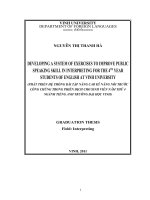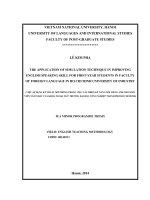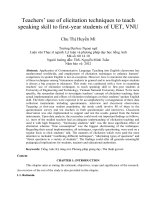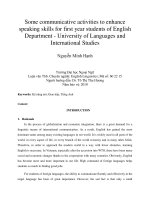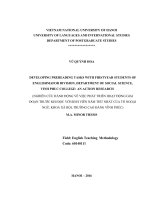Developing speaking skills for first year students of faculty of english hanoi open university
Bạn đang xem bản rút gọn của tài liệu. Xem và tải ngay bản đầy đủ của tài liệu tại đây (968.52 KB, 64 trang )
CODE: 27 DEVELOPING SPEAKING SKILLS FOR FIRST – YEAR STUDENTS OF FACULTY OF ENGLISH – HANOI OPEN UNIVERSITYHANOI,
Developing Speaking Skills for first – year students of Faculty of English – Hanoi Open University
HANOI OPEN UNIVERSITY
FACULTY OF ENGLISH
---*
*---
GRADUATION THESIS B.A DEGREE IN
ENGLISH STUDIES
DEVELOPING SPEAKING SKILLS FOR
FIRST - YEAR STUDENTS
OF FACULTY OF ENGLISH – HANOI OPEN UNIVERSITY
Supervisor: Nguyen Thi Hong Minh, M.A
Student: Vu Thuy Dung
Date of birth : 11/ 08/ 1994
2016
Class: K19A07 (2012- 2016)
Hanoi, 2016
Vũ Thùy Dung – K19A07 ( 2012 – 2016)
Developing Speaking Skills for first – year students of Faculty of English – Hanoi Open University
DECLARATION
DEVELOPING SPEAKING SKILLS FOR FIRST - YEAR STUDENTS
OF FACULTY OF ENGLISH – HANOI OPEN UNIVERSITY
I certify that no part of the above reports has been copied or reproduced by
me from any person’s work without acknowledgement and that report is
originally written by under strict guidance of my supervisor.
Hanoi, 15th April, 2016
Student
Vũ Thùy Dung
Supervisor
Nguyễn Thị Hồng Minh, M.A
Vũ Thùy Dung – K19A07 ( 2012 – 2016)
Developing Speaking Skills for first – year students of Faculty of English – Hanoi Open University
ACKNOWLEDMENTS
During the time I implement to research and complete this paper, I
would like to express my deep gratitude to Ms Nguyễn Thị Hồng Minh, M.A,
my supervisor for her sincere advice and patient guidance as her
encouragement to my study. Without her help, my graduation paper would
have been impossible to be fulfilled.
I also would like to give my great thanks to the Management Board of
the Faculty for providing favorable conditions for my study to be carried out.
I also owe to Faculty of English. Hanoi Open University, all my
teachers and the librarians for their help, encouragement and supports.
Besides, I would like to express my deep thanks to my friends who
encourage me to choose the subject and supply me a lot of materials in the
writing of this paper.
Finally, I am debited to my beloved parents who give me the best
materials and intellectual condition to study.
Hanoi, 15th April, 2016
Student
Vũ Thùy Dung
Vũ Thùy Dung – K19A07 ( 2012 – 2016)
Developing Speaking Skills for first – year students of Faculty of English – Hanoi Open University
TABLE OF CONTENT
PART A: INTRODUCTION ....................................................................... 2
1. Rationale .............................................................................................. 2
2. Aims and objectives of the study ........................................................ 3
3. Scope of the study................................................................................ 3
4. Research questions .............................................................................. 3
5. Methods of the study ........................................................................... 4
6. Design of the study .............................................................................. 4
PART B: DEVELOPMENT ........................................................................ 5
Chapter 1: Literature review...................................................................... 5
1.1
The definition of the English speaking skills .................................. 6
1.2
The importance of the English speaking skills ............................... 8
1.3
Common components making Speaking skills difficult ................. 9
1.3.1
Clustering .................................................................................. 10
1.3.2
Redundancy............................................................................... 10
1.3.3
Reduced forms........................................................................... 10
1.3.4
Performance variables .............................................................. 10
1.3.5
Colloquial language .................................................................. 11
1.3.6
Rate of delivery.......................................................................... 11
1.3.7
Interaction ................................................................................. 11
1.4
Summary of this chapter ............................................................... 11
Vũ Thùy Dung – K19A07 ( 2012 – 2016)
Developing Speaking Skills for first – year students of Faculty of English – Hanoi Open University
Chapter 2: Analyses, Findings & Interpretations ................................... 12
2.1Design and methodology .................................................................... 12
2.1.1 The setting of the study ................................................................ 12
2.1.2 Data collection instrument ......................................................... 12
2.2
Preliminary results ........................................................................ 13
2.2.1 Student’s opinions on speaking skills ......................................... 14
2.2.2
Student’s opinions on learning speaking skills in group work.. 15
2.2.3
Students appreciation of the use of group work in the speaking
class at Faculty of English .................................................................... 16
2.2.4
The best group size and difficulties the students had when
working in group work .......................................................................... 19
2.2.5 Student’s desire for the better group work ................................. 21
2.3
General remarks ............................................................................ 22
2.4
The findings .................................................................................. 24
2.4.1 The lack of self-confidence......................................................... 24
2.4.2 The limitation of vocabulary ....................................................... 26
2.4.3. The mispronunciation and misunderstanding in using grammar
............................................................................................................... 28
2.4.4. The lack of general knowledge. .................................................. 30
2.4.5. Unfamiliar partner ...................................................................... 31
2.4.6. The lack of motivation and flexibility in speaking English. ........ 32
2.5.
Summary ........................................................................................ 32
Chapter 3: Suggestions to deal with the problems .................................. 33
Vũ Thùy Dung – K19A07 ( 2012 – 2016)
Developing Speaking Skills for first – year students of Faculty of English – Hanoi Open University
3.1
Develop speaking skills through Pronunciation ........................... 33
3.2
Develop speaking skills through Grammar ................................. 34
3.2
. Develop speaking skills through reflective listening.................. 36
3.4
Develop speaking skills through reading...................................... 37
3.5
Enrich general knowledge ............................................................. 38
3.6
Build self-confidence ..................................................................... 40
3.6.1 Overcome fear of making mistakes ............................................. 40
3.6.3 Pay attention to physical appearance ......................................... 44
3.6.4 Prepare the topic carefully.......................................................... 44
3.6.5 Improve English self-study skills ................................................ 44
3.7
Improve group speaking ............................................................... 46
3.7.1 Working in pairs .......................................................................... 46
3.7.2 Working in small groups ............................................................. 47
3.8
Join activities outside class ........................................................... 49
3.8.1 Join the English speaking clubs ................................................. 49
3.8.2 Communicate with native speakers ............................................. 50
3.9
Summary ........................................................................................ 50
PART C: CONCLUSION ......................................................................... 51
Vũ Thùy Dung – K19A07 ( 2012 – 2016)
Developing Speaking Skills for first – year students of Faculty of English – Hanoi Open University
LISTS OF FIGURES AND TABLES
Table 1. Student’s opinions on speaking skills .............................................. 14
Table 2. Student’s opinions on learning speaking skills in group work ........ 15
Table 3. Students assessment for the teachers frequent use of group work ... 16
Table 4. Students appreciation of their participation in group work............. 17
Table 5: Student’s appreciation of group work for the benefit of speaking ... 18
Table 6: The best group size and difficulties the students had when working in
group work ................................................................................................... 19
Table 7: Student’s desire for the better group work...................................... 21
Vũ Thùy Dung – K19A07 ( 2012 – 2016)
PART A: INTRODUCTION
1.
Rationale
Nowadays, with the development of economy and society, demands of
communication of human are increasing constantly. In the past, when mass
media was not developed yet, we could only communicated with the people
who spoke the same language with you, mother tongue for example, but now
the tide has turned. Communicative demands, associating new relationships
are essential for the youth today. In the aim of associating with the foreigners,
learning English is also a very important task. However, not everyone can be
confident in their speaking competence and their communicating competence
even students who study in faculties of English. Furthermore, non-native
speakers will have to face with many difficulties when learning speaking
English. It will take time, practice and perseverance. Mastering speaking
skills is an advantage which leads to the success in communication.
Speaking skills is one of the necessary skills for the present students but
some students have not yet been really interested in this problem. Many
students have not yet clearly presented a problem, his view in front of the
class. Some students think that they only focus on the specialized knowledge
without speaking skills. So, concentration on both the specialized knowledge
and the development of the speaking skills are necessary for the students.
Being a senior student, I found the difficulties in speaking of the firstyear students of the Faculty of English at Hanoi Open University. Thus, I
decide to write about the strategies to develop speaking skills for first-year
students and some effective ways in order to help them develop their speaking
skills.
Vũ Thùy Dung – K19A07 ( 2012 – 2016)
2.
Aims and objectives of the study
The study focuses on the review of the Speaking skills definition and types.
On the other hand, this study also mentions some strategies which relate to
develop speaking skills for students. These aim are giving some basic
knowledge about speaking skills and suggesting some effective strategies to
enhance Speaking competence. Hopefully, this study will help the first-year
students in developing their own skills.
3.
Scope of the study
Due to time limitation, the focused area of the research will only be among
the first-year students of the Faculty of English at Hanoi Open University.
This study mainly relates to the difficulties of first-year student in speaking
skills and focuses on some strategies to help them speak better.
4.
Research questions
With the aims mentioned earlier are to find out some strategies which help
students develop their speaking skill and speaking competence. The research
questions were addressed as following and this thesis was hoped to answer
them:
• To investigate the theories of English Speaking Skills, importance
of Speaking skills and common components making Speaking skills
difficult.
• What do the first-year students of the Faculty of English at HOU
find the most difficult when using verbal English?
• What are some suggestions for the students to develop their
speaking abilities?
Vũ Thùy Dung – K19A07 ( 2012 – 2016)
5.
Methods of the study
To achieve the aims stated above, I read some referenced books in the library
as well as books from my teacher. Moreover, I found some useful information
on Internet which relate to my study. I also discussed with my supervisor,
teachers and classmates who are learning English. To complete this study, I
carried out surveys and interviews to gain better insight into the real situation
then I bring them into this paper.
6.
Design of the study
The study is divided into three parts:
Part A: Introductionis the introduction of the study including the rationale,
aims and purposes, scope, research questions, methods and design of study.
Part B: Development
This part consist of three chapters:
Chapter 1: Literature review
This chapter provides and introduces some definitions and theories relatedto
speaking skills.
Chapter 2:Analyses, Findings & Interpretations
It is the main part of study, which discloses the real situation of first-year
English-majored students at Hanoi Open University in using verbal English,
the difficulties which the students had when they study speaking skills.
Chapter 3: Suggestions to deal with the problems
In this chapter, I want to inform some suggestions to deal with the problem.
Vũ Thùy Dung – K19A07 ( 2012 – 2016)
Part C: Conclusion
This chapter is the concluding part where the author gives the conclusion and
sum up main ideas of the graduation paper.
PART B: DEVELOPMENT
Chapter 1: Literature review
Vũ Thùy Dung – K19A07 ( 2012 – 2016)
1.1The definition of the English speaking skills
As far as the researcher is concerned, there has been a myriad
of definitions of speaking. According to the Oxford Dictionary of Current
English(2009, p.414), speaking is “the action of conveying information or
expressing ones’thoughts and feelings in spoken languages.
Merriand – Webster online dictionary gave a general definition of
speaking:
“Speaking is uttering words or articulating in sounds with the ordinary
voice. Speaking is the way to covey thoughts, opinions, exchange orally, or to
express oneself.”
We can simply understand this definition that if we propose our
opinions, share ideas of express something, we have to use our voice, our
words to make other people what we mean. By this way we can communicate.
Chaney (1998, p.13), however, considered speaking a process:
“speaking isthe process of building and sharing meaning through the use of
verbal or non-verbal symbols in a variety of contexts”. Sharing the same
viewpoint,Florez (1999, p.1) added that speaking is an “interactive” process,
which consists of three main stages “producing, receiving and processing
information.”
In language teaching and learning, speaking is considered a skill
topractice and master. In this light, Nunan (2003, p.48) put it that “speaking
isthe productive oral skill. It consists of producing systematic verbal utterance
toconvey meaning.” Also considering speaking as a skill, Bygate (1987,
Vũ Thùy Dung – K19A07 ( 2012 – 2016)
p.3)investigated the distinction between knowledge and skill in speaking
lesson,which he considered as crucial in the teaching of speaking. Indeed, to
be
agood
learner of speaking,
studying
knowledge of
grammar,
vocabulary,pronunciation, intonation, etc. is not enough but the skill to use
this knowledgeto communicate successfully is indispensable.
In brief, there are different concepts of speaking, i.e. speaking as
anaction, a process and a skill. In this study, the term “speaking” will be used
torefer to a skill related to language teaching or learning.
Another point of view on speaking is:
“Speaking is an interactive process of constructing meaning that
involved producing and receiving and processing information. Its form and
meaning are dependent on the context in which it occurs, including the
participants themselves, their collective experience, the physical environment
and the purposes for speaking” (Brown(1994); Burns and Joyce(1997)).
From this point of view we can simply say that in certain situations we
use certain type of language to say. For example in a conference we often use
formal language and in daily life we often use informal language.
On the other hand, this speaking definition regards speaking as an
activity taken place between the speakers and the listeners. The speakers and
the listeners interaction take place the real time, thereby allowing very little
time for the speaker to respond to the listener if the rules of a conversation are
to be maintained. In the interaction, the speaker gives out message to the
listener. The listener gets the message from the speaker and gives the speaker
feedback as to whether or not the listener has understood what the speaker has
Vũ Thùy Dung – K19A07 ( 2012 – 2016)
just said or asked for more information. This process will be repeated for
many times to get clear meaning of communicative interaction (McDonough
and Shaw, 1993; Harmer, 1994).
The definition of speaking skills is much diversified. In Cambridge
Dictionary, speaking skills are defined quite simply. They are skills “to say
words, to use the voice, or to have a conversation with someone”. Another
famous dictionary, Oxford Advanced Dictionary defined speaking skills as
skills “to press or communicate opinions, feelings, idea, etc; by or as talking
and it involves the activities in the part of the speaker as psychological,
physiological (articulator) and physical (acoustic) states.”
In conclusion, the definitions of speaking are numerable because of the
complexity of this process. Speaking is a productive skill and the main
purpose this process is to transfer information and communicate or to express
the speaker’s opinions and thoughts. It helps learners express their ideas
clearly and smoothly. A good speaking skill plays an important role to help
learners make a successful conversation. Therefore, learners should make all
their efforts to be effective speakers by becoming involved active in speaking.
1.2The importance of the English speaking skills
Among the four skills in learning English, speaking and writing are the
productive skills. However, speaking is regarded as very important for
language teaching and learning. Speaking is a bridge to reach other skills.
Speaking helps learners to read better, to listen more effectively and write
more accurately. Speaking is surely the most effective means of
communication. (Ur, 1996).
Vũ Thùy Dung – K19A07 ( 2012 – 2016)
There are two most important reasons why speaking should be taught in
the classroom. The first reason is speaking is a good source of motivation for
students. Nunan (1991) points out, “success is measured in terms of the
ability to carry out a conversation in the (target) language”. For the students
who have ability to speak English eligibly, they want to speak English; they
know to express themselves in English. Thus, they always speak when
possible. But for those who cannot speak English well, they do not want to
speak in group. As a result, they may soon get de-motivated and lose interest
in learning English. In addition to this, in the English speaking class, if the
speaking activities are organized in the suitable way, speaking can have a lot
of fun and therefore can raise motivation in the learners. If the speaking is
practiced successfully, the other skills can also be improved through speaking.
For the second reason, nowadays, the demand for communication
among people is really important. Without it, the life does not exist. For this,
speaking always plays an important role in people’s lives. Speaking is
considered as a survival skill in real life. (Ur, 1996; p 134).
For the ideas above, speaking skills also play the key role in foreign
language learning and teaching.
1.3Common components making Speaking skills difficult
Becoming the first-year students of Faculty of English, Hanoi Open
University, most of them do not accustomed to speak English in class. They
feel worried about speaking in class. They feel worried about speaking in
class time and oral tests. Specially, the students who come from the other
regions, they do not have a standard in pronunciation. Moreover, in speaking,
there are a lot of ellison’s phenomena, structures can be reduced as much as
Vũ Thùy Dung – K19A07 ( 2012 – 2016)
possible that is depended on the certain contexts etc. Thus, it is really hard for
them in practicing not only speaking skills but also the other skills.
Here are some popular difficulties that may make students confused
during practicing speaking. Of course, there are many other phenomena in
language they may meet. However, in this scope of this study, I only mention
to some difficulties that are easy to recognize in speaking.
1.3.1 Clustering
Fluent speech is phrasal, not word by word. Learners can organize their
output both cognitively and physically (in breath groups) through such
clustering.
1.3.2 Redundancy
The speaker has an opportunity to make his/her meaning clearer
through the redundancy of language. Learners can capitalize on this feature of
spoken language.
1.3.3 Reduced forms
Contractions, elisions, reduced vowels, etc. all form special problems in
teaching spoken English. Students who don’t learn colloquial contractions can
sometimes develop a stilted, bookish quality of speaking that in turn
stigmatize them.
1.3.4 Performance variables
One of the advantages of spoken language is that the process of
thinking as you speak allows you to manifest a certain number of performance
hesitations, pauses, backtracking, and corrections. You can actually teach
learners how to pause and hesitate. For example, in English our “thinking
time” is not silent, but rather we insert certain “fillers”: uh, um, well, you
Vũ Thùy Dung – K19A07 ( 2012 – 2016)
know, I mean, like, etc. One of the most salient differences between native
and nonnative speakers of a language is in their hesitation phenomena.
1.3.5 Colloquial language
Making sure your students are reasonably well acquainted with the
words and idioms and phrases of colloquial language and that they get
practice in producing these forms.
1.3.6 Rate of delivery
Another salient characteristic of fluency is rate of delivery. One of your
tasks in teaching spoken English is to help learners to achieve an acceptable
speed along with other attributes of fluency.
This is the most important characteristic of English pronunciation. The
stress-timed rhythm of spoken English and its intonation patterns convey
important messages.
1.3.7 Interaction
As noted in the previous section, learning to produce waves of language
in a vacuum – without interlocutors – would rob speaking skills of its richest
component: the creative of conversational negotiation.
1.4Summary of this chapter
This chapter focuses on presenting theory and some definitions of
specific terms to help students understand more about speaking skills and
problems students can have during the process of practicing speaking skills.
Also it highlights them… In short, this chapter shows an overview of
speaking skills and some popular problems for students to have basic
knowledge about them.
Vũ Thùy Dung – K19A07 ( 2012 – 2016)
Chapter 2: Analyses, Findings & Interpretations
2.1Design and methodology
2.1.1 The setting of the study
My survey questionnaire was hand out to 60 first-year students at
Faculty of English, Hanoi Open University. They are both males and females
at the age of 18 to 20. They are in the pre-intermediate level and are very
interested in English. The study is carried out with a main aim of improving
the speaking skills for the first-year students major at Hanoi Open University.
There are many good reasons for choosing the freshmen as the subject of the
study. First of all, these students have just left high school where they never
do acquainted with speaking skills so when they began their study at a
university, speaking is really strange to them. On the contrary, at the
university they have to cope with many problems such as: listening, writing,
reading and speaking. Besides the freshmen always lack self-confidence when
being engaged in speaking practice. They also lack speaking environment and
have problems of using their mother tongue. For instance, when they join in
speaking activities they usually get troubles with expressing their mind in
English. Finally, to help those who have tried much but still not become good
speakers. These are reasons why I decided to do the study on using games for
the first-year students to improve speaking skills.
2.1.2 Data collection instrument
Some aspect of teaching and learning can be investigated through
administering a questionnaire. Questionnaires are useful for gathering
information about effective dimensions of teaching and learning and enable a
teacher to collect a large amount of information quickly. Advantages of using
questionnaire which Gillham (2000) highlights are: less pressure on
respondents, not under pressure of interview bias and analysis of answer is
straightforward. The researcher used the survey questionnaire as the main
sources to fulfill its aims. Two collections of questionnaires were created to
the opinion of both teacher and student about the use of teamwork in the
Vũ Thùy Dung – K19A07 ( 2012 – 2016)
speaking classes of the 1st year students at Faculty of English. Clear
instructions were given when the questionnaire was administered.
14 English questionnaires are designed for 60 students (2-3 classes of
the same level in the first-year). The questionnaire was divided into 5 main
parts:
Part 1: Students opinions on speaking skill (Question 1, 2, 3)
Part 2: Students opinions on learning in group work (4)
Part 3: Students appreciation of the use of group work in the speaking
class at Faculty of English (5, 6, 7)
Part 4: The difficulties of the students when working in groups for
speaking skill (8, 9, 10 and 11)
Part 5: The students wishes in working in groups (12, 13, 14)
2.2Preliminary results
Before giving the concrete result of the survey, the researcher will show
the preliminary result.
Vũ Thùy Dung – K19A07 ( 2012 – 2016)
2.2.1 Student’s opinions on speaking skills
Table 1. Student’s opinions on speaking skills
Options/
a
b
c
d
16
10
60
54
54
6
0
0
54
6
0
0
Question
1
a. English
speaking
compulsory
at
is
your
university.
b. You just want to pass
the oral exam.
c. Speaking is necessary
for your future job.
d. You are interested in
the speaking skills.
2
a. Very
b. Rather
c. Little
d. Not at all
3
a. Very
b. Rather
c. Little
d. Not at all
Vũ Thùy Dung – K19A07 ( 2012 – 2016)
This table reveals opinions of Faculty of English’s students on speaking
skills. It can obviously be seen that all the students asked (100%) said that
Speaking was necessary for their future job and 90% of them were interested
in speaking skills while a small amount of them (26%) said they learned
speaking skills because English was compulsory at their university. They
found English really interesting while there were only a few student (17%)
who wanted to learn speaking skills just to pass the oral test. 90% of them
stated that English was so important for them.
2.2.2 Student’s opinions on learning speaking skills in group work
Table 2. Student’s opinions on learning speaking skills in group work
Not at
Little
Rather Very
all
1. Individually
0
60
0
0
2. In a small group
0
1
23
36
3. With the whole class
0
60
0
0
Vũ Thùy Dung – K19A07 ( 2012 – 2016)
The table 2 dedicates that students had very little favor for working
individually, 38% of them rather like working in a small group, and 60%
(more than half of students asked) really like working in group in the
speaking skills. And no student reported that they did not like working on
their own. From this, it can be understood that most of the students saw the
importance of working in group for the better speaking skills. In addition to
that, group work is surely the most suitable activity for speaking skills.
2.2.3 Students appreciation of the use of group work in the speaking class at
Faculty of English
Table 3. Students assessment for the teachers frequent use of group work
Options/
a
B
c
d
Question
5
a. Always
b. Often
0
51
9
0
c. Sometimes
d. Never
Not very surprising information from table is that the students (85%)
affirmed that the teachers in their university used the group work in the
speaking lesson very often because it was compulsory that the teachers
implemented this to follow the book activities planned in the teacher’s book
and made the students get used to doing this for any oral test and may be for
the students future job. This is of great use in helping the students to
communicate with each other.
Vũ Thùy Dung – K19A07 ( 2012 – 2016)
Table 4. Students appreciation of their participation in group work
Options/
A
b
c
d
18
6
17
19
Question
6
a. Work with great interest
b. Remain silent all the
time.
c. Chat with other group
members
about
other
topics
d. Speak in Vietnamese to
discuss with other while
other discuss in English
As can be seen from table 4, just only 30% of the students asked (18
out of 60) reported that they had taken part in the group work activities
enthusiastically and the number of the students who did not participate in
group worked by chatting with other group or speaking Vietnamese is rather
high (29% and 32% irrespectively) that it must be looked into consideration
about the group work among these students in these two classes. In addition
to that, the number in the table also indicates that the students in these two
classes may have very low proficiency of speaking skills or not enough
English background knowledge to communicate with their partners or may be
the topic is no interest to them.
When being asked why some of them kept silent in the speaking lesson,
they said they did not know what to speak and how to speak. The teacher
Vũ Thùy Dung – K19A07 ( 2012 – 2016)
asked them to speak English in group means making them quiet. But when
the teacher asked them to contribute their ideas in Vietnamese, they said that
they could not think of anything. Another reason why they kept silent is that
many students could not understand the English – speaking teachers’
instructions. The researcher in this study thought that maybe they were the
worst students in these two classes. There would be very little chance for
them to pass any oral tests.
(Question 7)
Table 5: Student’s appreciation of group work for the benefit of speaking
Not at all
Little
Rather
Very
a. Speak more in English
58
b. Feel more confident
60
c. Give
you
more
opportunities
60
for
exchanging ideas
d. Learn from each other
18
41
It can be surely seen from the table that almost all the students (97%:
58 out of 60) found that the group was so beneficial for their speaking skills
that they can speak more in English, they can be much more confident and
they also have chance to exchange their ideas with their friends. Regarding
the benefit of learning from each other of group work, 68% (41 out of 60) the
Vũ Thùy Dung – K19A07 ( 2012 – 2016)
students stated that it was rather beneficial but only 30% (18 out of 60)
thought it is a little beneficial.
2.2.4 The best group size and difficulties the students had when working in
group work
Table 6: The best group size and difficulties the students had when working in
group work
Options/
a
b
c
d
Question
8
a. From three to five
15
3
12
30
17
40
3
0
a. It’s difficult to talk with some 16
18
26
0
b. More than five
c. The more the merrier
d. It depends on the kind of activities
9
a. Yes, often
b. Yes, sometimes
c. Yes, but rarely
d. No, never
10
partners
b. The other partners talk over you
c. The other partners talk less than you
d. Other
Vũ Thùy Dung – K19A07 ( 2012 – 2016)


